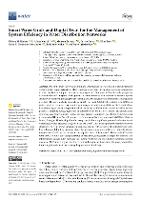Smart Water Grids and Digital Twin for the Management of System Efficiency in Water Distribution Networks
Fecha
2023-03-15Autor(es)
Ramos, Helena M.
Kuriqi, Alban
Besharat, Mohsen
Creaco, Enrico
Tasca, Elias
Coronado-Hernández, Oscar E.
Pienika, Rodolfo
Iglesias-Rey, Pedro
Metadatos
Mostrar el registro completo del ítemResumen
One of the main factors contributing to water scarcity is water loss in water distribution
systems, which mainly arises from a lack of adequate knowledge in the design process, optimization
of water availability, and poor maintenance/management of the system. Thus, from the perspective
of sustainable and integrated management of water resources, it is essential to enhance system
efficiency by monitoring existing system elements and enhancing network maintenance/management
practices. The current study establishes a smart water grid (SWG) with a digital twin (DT) for a
water infrastructure to improve monitoring, management, and system efficiency. Such a tool allows
live monitoring of system components, which can analyze different scenarios and variables, such as
pressures, operating devices, regulation of different valves, and head-loss factors. The current study
explores a case study in which local constraints amplify significant water losses. It develops and
examines the DT model’s application in the Gaula water distribution network (WDN) in Madeira
Island, Portugal. The developed methodology resulted in a significant potential reduction in real
water losses, which presented a huge value of 434,273 m3
(~80%) and significantly improved system
efficiency. The result shows a meaningful economic benefit, with savings of about EUR 165k in water
loss volume with limiting pressures above the regulatory maximum of 60 m w.c. after the district
metered area (DMA) sectorization and the requalification of the network. Hence, only 40% of the
total annual volume, concerning the status quo situation, is necessary to supply the demand. The
infrastructure leakage index measures the existing real losses and the reduction potential, reaching
a value of 21.15, much higher than the recommended value of 4, revealing the great potential for
improving the system efficiency using the proposed methodology.
Citar como
Ramos, H.M.; Kuriqi, A.; Besharat, M.; Creaco, E.; Tasca, E.; Coronado-Hernández, O.E.; Pienika, R.; Iglesias-Rey, P. Smart Water Grids and Digital Twin for the Management of System Efficiency in Water Distribution Networks. Water 2023, 15, 1129. https://doi.org/10.3390/w15061129Utilice esta dirección para citar:
https://hdl.handle.net/20.500.12585/12109Colecciones
- Productos de investigación [1453]
Compatible para recolección con:

Archivos
El ítem tiene asociados los siguientes ficheros de licencia:
Universidad Tecnológica de Bolívar - 2017 Institución de Educación Superior sujeta a inspección y vigilancia por el Ministerio de Educación Nacional. Resolución No 961 del 26 de octubre de 1970 a través de la cual la Gobernación de Bolívar otorga la Personería Jurídica a la Universidad Tecnológica de Bolívar.













